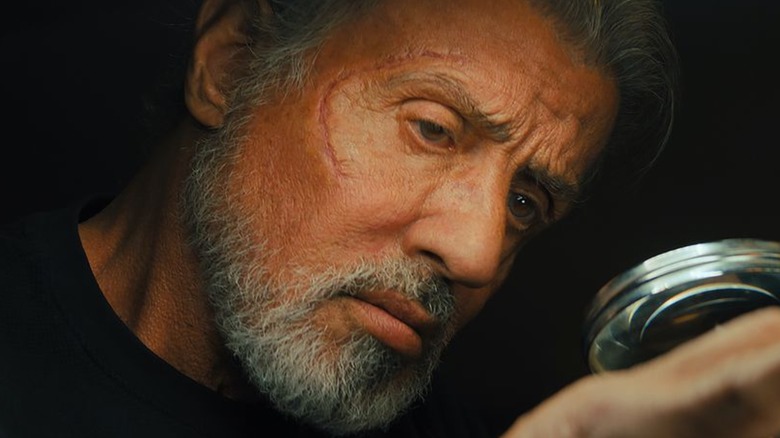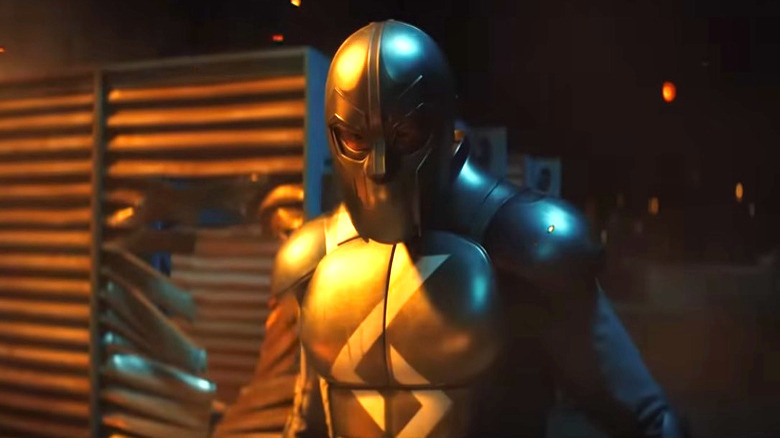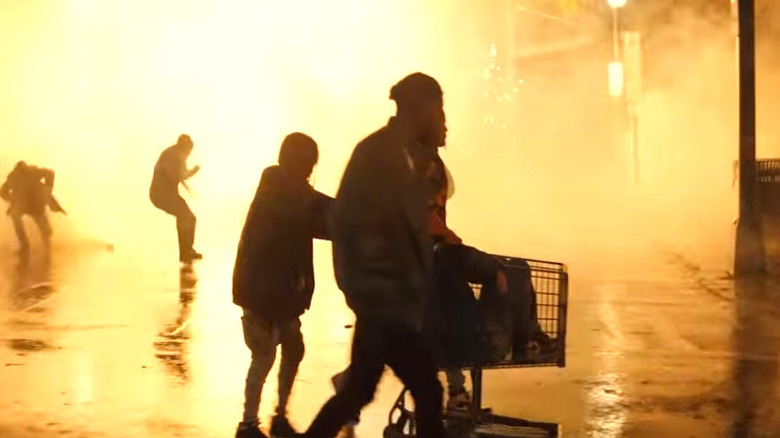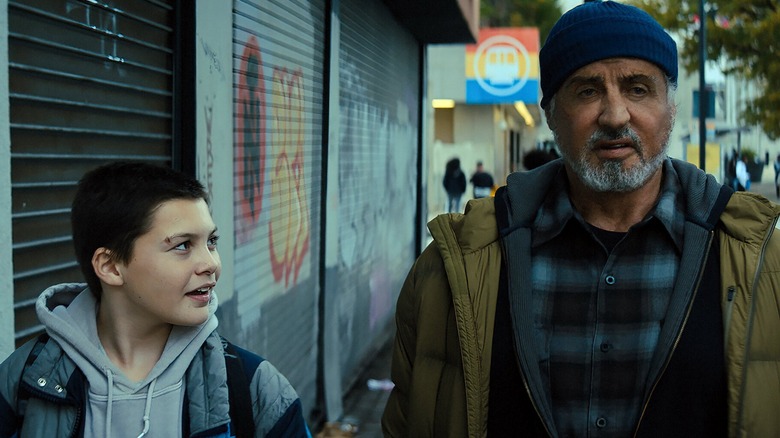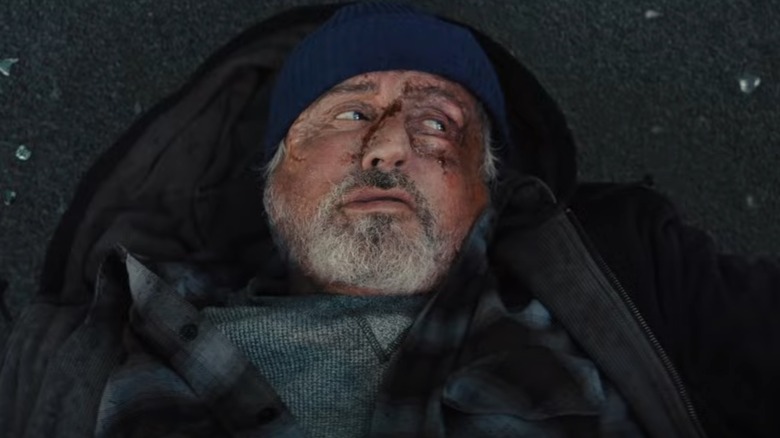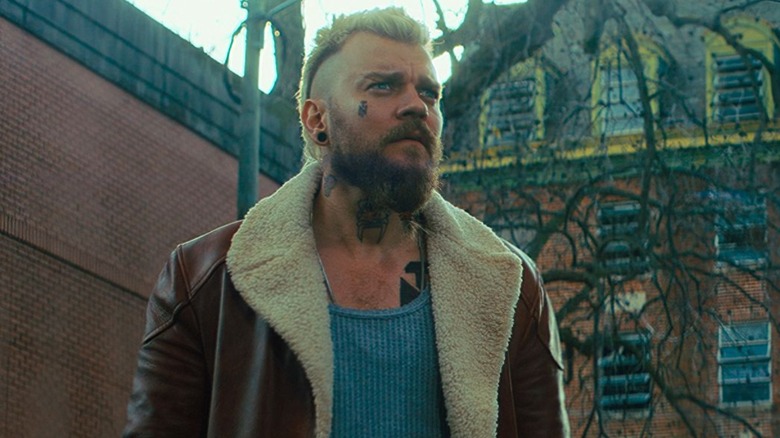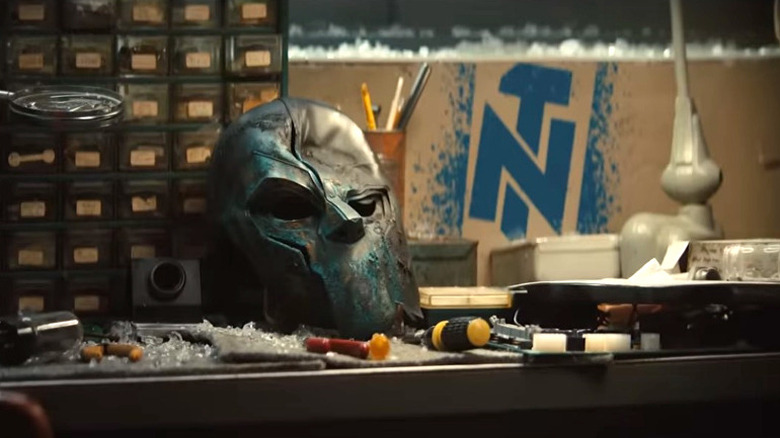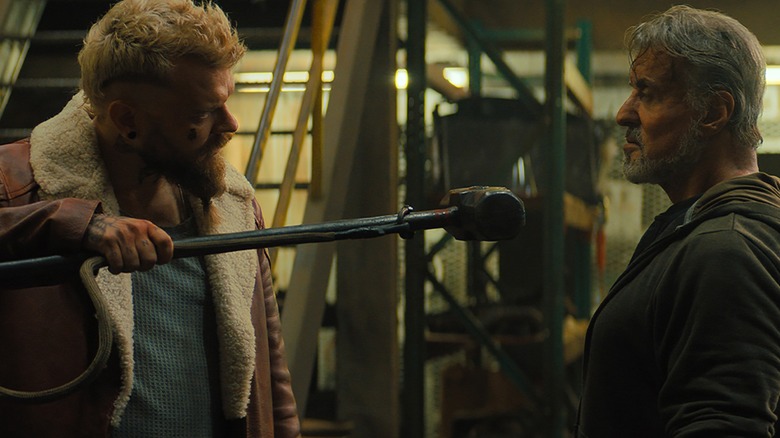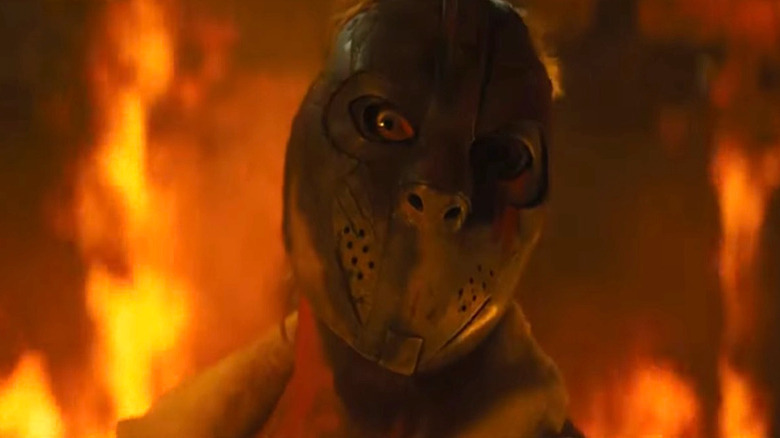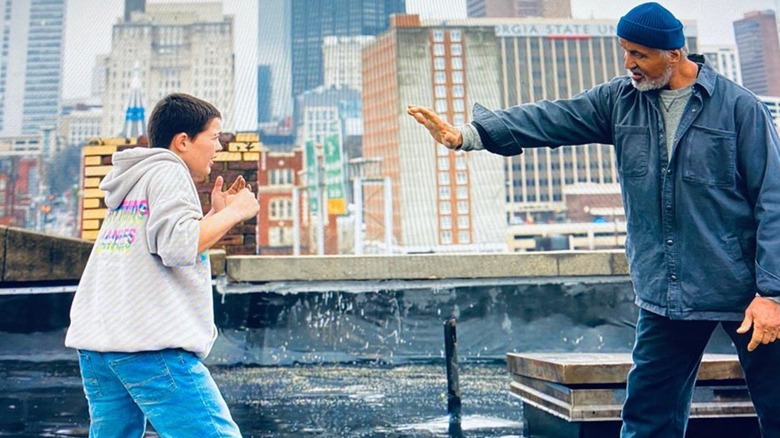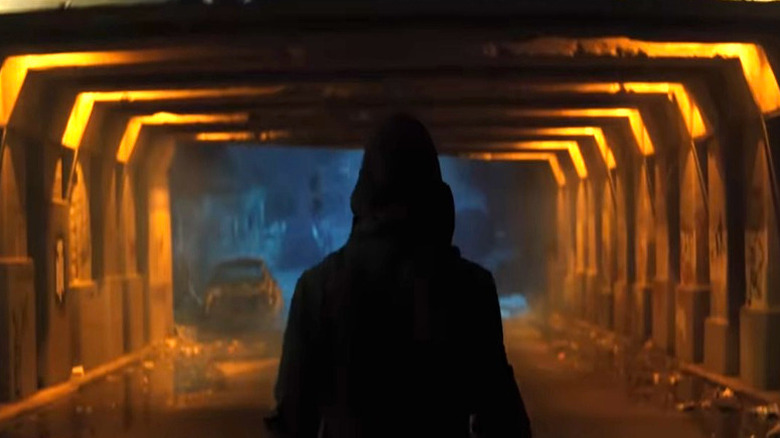The Ending Of Samaritan Explained
Amazon's "Samaritan" is a parable about the existence of good and evil within the hearts of every person, expressed through the language of superhero cinema. It's a throwback to the smaller-scale, lesser-known superhero fare we saw in the very late '80s and into the mid-'90s. There's no world-ending threat. No one fires a blue beam into the sky. There's just a kid at a crossroads and an old man trying to repair his life.
The film stars Sylvester Stallone as Joe, a simple garbage man who lives a quiet life repairing broken machines in his small apartment. Javon Walton plays Sam, a kid dangerously close to finding out what one mistake can do to your life. He idolizes Samaritan, a hero who disappeared decades ago, and he begins to believe Joe is Samaritan's secret identity. The truth, as it so often does, turns out to be a little grayer than you might initially expect.
The nature of good and evil is at the heart of every superhero story. "Samaritan" explores that in great detail, leading up to a final climax that doesn't end with dazzling special effects or the "good guy" winning an award. Instead, the fairly understated finale of the film deals primarily with a change in perspective. It ends with our protagonist learning that not everything is as cut and dry as he'd believed. In this new knowledge, though, is hope for a better future. We're going to break down all the moments that feed into that change, and why they ultimately build to the satisfying ending of "Samaritan."
Good Guy vs. Bad Guy
The film's prologue introduces Samaritan and Nemesis, two brothers who were inhumanly strong but ventured down very different paths. As their names would suggest, Samaritan was the good guy and Nemesis was the bad guy. After a battle at the power plant, Samaritan died and Nemesis disappeared. Decades later, the citizens of Granite City (the fictional metropolis where the story takes place) are split in two. Most of them are unemployed and turning to crime in order to survive, while the others appear to be going on as if nothing's wrong, exploiting the poor for profit.
The people of Granite City define themselves by which superhuman brother they identify with. For instance, Sam spends much of his time filling his notebook with cartoons of Samaritan. He watches videos of a local bookstore owner and author named Albert (Martin Starr) doing interviews about how he believes Samaritan is still alive. He's always on the lookout for anyone showing signs of super strength (including the school janitor), because he wants to prove that good still exists.
On the flip side, Cyrus (Pilou Asbæk) idolizes Nemesis. He may have been violent, but to Cyrus, Nemesis was the hero because he went after people who deserved it, hurting people who hurt his community. So, from the start of the film, there's a debate going on about what exactly makes someone good and what makes them bad.
The city of granite
Fictional cities are a proud tradition in superhero stories. It allows a setting to become iconic in its own right, while freeing creators from any restrictions that come with accuracy to a real-world environment. In the case of "Samaritan," however, it's also used as a metaphor. We don't get to see Granite City in its heyday, but we're meant to believe there was a time when things weren't quite so bad.
When we come into the story, Granite City is a mess. There's rampant crime and unemployment. Little kids are forced to deal with criminals just to make a little money. Times are really tough and only getting worse. With a name like Granite City, it stands to reason that this is a devastated place, where any structures that might have once helped the citizens thrive have failed and crumbled. The people are no longer surrounded by buildings — they live amongst granite.
However, granite is also a very hard substance, and difficult to destroy. Even when people like Cyrus and his gang think the city is hopeless and that they can destroy it and take control, the people of the city are stronger than they realize. Yes, things are tough, but they can survive as long as they don't give in to their fear. The same is true of our protagonist, Sam.
A kid named Sam
Sam Cleary lives in a small apartment with his mother, Tiffany (Dascha Polanco). Sadly, his father died years ago. His mom is always busy at the hospital, and because she gets paid on the 5th of the month — while rent is due on the 1st — they're always getting locked out of their apartment. Seeing his mom struggle motivates Sam to help bring in some money. Unfortunately, that means dealing with a dangerous man named Cyrus.
Like the city he lives in, Sam is hard to break. After Joe saves him from a savage beating, he will not stop pestering him. He's the same way with Alburt, running to him every time he thinks he's spotted Samaritan. However, times have gotten so bad for him that he's on the verge of breaking. Cyrus offers him money to help his crew commit crimes. Sam could easily go down that path, but he'd be leaving his soul behind.
When he gets in trouble, his mother always defends him by saying he's a good kid. She knows he's going through a lot, but she believes in him — just like he believes in Samaritan. He's torn between Samaritan and Cyrus, between what he sees as good and evil. Getting him to a point where he finally chooses to follow the right path is what the movie is all about. Sam learns he may not have superhuman strength, but he can still be a hero.
A guy named Joe
Joe Smith is a guy who likes to keep to himself. He isn't very confrontational. He doesn't greet everyone he walks by on the street. Instead, he walks to and from work with his hood up, not making eye contact. He finds pieces of busted machinery and repairs them because it's therapeutic, and working on them allows him to focus. He never comes out and says why he needs help focusing, but we do get quick flashes of what haunts him.
Joe is grappling with a difficult memory. It involves Samaritan and Nemesis, suggesting that Sam is right and Joe really is Samaritan. But one can't help but wonder: if he is Samaritan, why is he hiding? Why does he spend so much time fixing broken objects instead of broken people? Well, as is revealed in the third act, he is not Samaritan. Instead, he's his brother Nemesis.
You see, Samaritan really did die all those years ago. Since then, his brother has been silently paying penance for all the wrong he's done. He fixes those machines because he's trying to fix himself. He needs to stop dwelling on the past so much and focus on the present, and on healing. He still carries the scars of his final battle all over his back, and they may never go away. His brother will never return, but he can help the city by fixing his view of himself and the way he views the world.
From a certain point of view
Cyrus is the film's main antagonist. As a kid, he worshipped Nemesis. In his eyes, the villain attacked all the rich and powerful people who made it difficult for individuals in his community to survive. When Sam points out that Nemesis hurt people, Cryus replies, "Sometimes. But it's not always if you hurt, but who you hurt." He claims that Nemesis "always punched up," meaning he went after the people who really controlled Granite City as opposed to the underprivileged.
From the audience's perspective, though, Cyrus is definitely a bad guy. He steals, pays off cops, and commits murder. Add in his obsession with being the next Nemesis, and he's classic supervillain material. The people in his crew see him differently. The folks working for him came from broken homes, and he's given them structure and a family to believe in. Several of the downtrodden and hopeless in the city see him as a heroic figure because he too punches up.
Sometimes, anyway. He isn't opposed to beating his own people or shooting someone in the back (a typically villainous trait). Sam seems to know he's bad news and that he shouldn't work for him, but Cyrus offers him something no one else can: a chance to help his mother. The need to earn money can drive someone to venture to the wrong side of the law. Does that make them bad people? That's a question the ending of the film sets out to explore.
Fixing things
Granite City is breaking. The faith of its citizens is breaking. Sam is on the verge of breaking. Joe himself is already broken, but he's trying to fix himself. He feels guilt and regrets the things he's done, yet he chooses to keep out of the public eye. Wouldn't you think the best way for him to make amends would be to don his fallen brother's armor and take up his mantle as Samaritan? Well, no.
Try as he might, Joe isn't his brother. He didn't set out to protect the innocent — his drive was always, first and foremost, to simply punish the powerful. He was so at odds with his brother that he crafted a hammer powerful enough to hurt him with the sole purpose of murdering him. Now, despite what "Batman v Superman" may have you believe, you can't just become best friends with someone you conspired to kill, even if you have the same mother. Watching his brother fall to his death changed Joe, but he doesn't see himself as a hero.
Instead of trying to save the city by force, he's decided to live with his choices and let the people of Granite City sort their own problems out. This, of course, is a fallacy because Joe is a hero, the same way anyone can be a hero. He may not want to carry that crown, but he can't help it. When someone is in trouble, he rushes in, which is what happens when Sam is kidnapped by Cyrus.
Never meet your heroes
Word gets to Cyrus that Samaritan is alive when his goons run Joe over in retaliation for him beating them up. Having assumed he was dead, they were shocked to find him walking around like nothing happened. The only explanation is that this old man is in fact Samaritan. Unwilling to exist in a world where the "good guy" still lives, Cyrus kidnaps Sam, knowing Joe will come looking for him. The plan works, but there's a twist Cyrus couldn't have predicted.
While he fights with Joe, he mocks him repeatedly by calling him "the good guy." Finally, Joe's fed up and lets Cyrus and all his little cronies know that he is the bad guy. It's a shock for Cyrus, who's been trying to reclaim Joe's mantle as Nemesis. What makes it worse is that Joe hasn't been living up to the promise Nemesis made in Cyrus' mind. He thought this was a guy who would take down the powerful, but instead, he hides away while everyone suffers.
Seeing this as his opportunity to finish the job Nemesis started and surpass his childhood hero, Cyrus cuts out the power across the city. He's hit with another truth: Nemesis didn't attack the power plant to teach anyone a lesson — it was a trap for his brother. Having his reality shattered sends Cyrus into a murderous rage, resulting in a final battle between himself and his idol.
Bad guy vs. bad guy
The final fight between Cyrus and Joe is about two things: doing what's right for the world, and saving Sam. This is Joe's shot to actually stand up and prevent something terrible from happening. If Cyrus gets his way, Granite City will be overrun by chaos. In a climax that mirrors his battle with his brother, Joe stops Cyrus by choosing to throw him to his death (previously, he allowed his brother to fall).
Most important, though, is saving Sam — literally and metaphorically. He's literally rescuing Sam from a dangerous man on a quest to bring Granite City down, while also keeping him off the path of corruption. He needs to show Sam that it's possible to do the right thing, even when the alternative looks easier. By taking down Cyrus and his goons, Joe is stopping them from completing their awful plan and making sure they can no longer prey on impressionable kids like Sam.
Had Sam never taken an interest in Joe, the city likely would've been lost in the dark for a long time, and there's the real possibility that Sam would have turned to a life of crime and become the next Cyrus. Because of Sam's dogged determination to find out Joe's secret, the old man came out of retirement one last time to save the city he used to hurt, and the soul of a kid who helped him live again.
Being a hero is a choice
After the fight with Cyrus, Joe grabs Sam, jumps through a wall of the burning building, and lands safely across the street. Sam doesn't hug him and thank him for saving his life — instead, he confronts him about his identity. He needs to know if Joe is really Nemesis, because he still has the same binary understanding of human nature: you're either good or bad.
When Joe confirms he is in fact Nemesis, Sam immediately tries to convince him that he doesn't have to be evil, that he can fix that just like he fixes broken machines. He has grown to love and admire Joe so much that he doesn't want to admit he was friends with someone who hurt people. This is when Joe delivers the message of the movie.
"If there was only bad people doing bad things, it'd be easy to get rid of 'em," Joe tells Sam. "But the real truth is, good and bad live in everybody's heart. And it's gonna be up to you to make the right choice." What the film is saying is that there are no inherently bad or good people, just bad and good choices and actions. Sometimes people get lost in their choices and spend the rest of their lives paying for them. Now Sam knows that he doesn't have to go down that path.
Samaritan lives
Like Batman so often does, Joe vanishes before the police arrive. Sam is escorted outside and mobbed by the media. His mom is there, of course, as is Albert. These are the people who care about him (even if Albert gives him a hard time), the ones who want the best for him. They're the ones who support him when all hell breaks loose while Cyrus' crew is nowhere to be seen, making it even clearer that Cyrus is no good.
The media wants to know if Samaritan is back. Sam grins and tells them he is. Now, a potential sequel could reveal that Joe has taken on the mantle of Samaritan, but it's more interesting if this remains metaphorical. Samaritan is dead. Joe really doesn't look like he's in any shape to keep beating people up. Why would he try to be a superhero?
Instead, Samaritan lives within Sam. He lives within the citizens of Granite City. He's a symbol of hope — a reminder of what can be accomplished when you choose to do the right thing. This isn't the end for the city. Granite doesn't break that easily.
